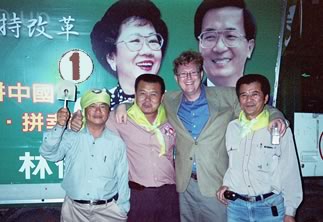Gries是美國外交官之子,他曾受邀觀察台灣2004年總統大選,圖為Gries與陳水扁支持者站在站在台南市競選看板前。
Force of China's impact grows in USA
http://www.usatoday.com/money/world/2006-12-12-china-impact-usat_x.htm#
By David J. Lynch, USA TODAY
Smack in the center of the country, more than a thousand miles from the Pacific Ocean, Oklahoma isn't a place most people regard as a hotbed of China fever.
So when China scholar Peter Gries flew to the University of Oklahoma for a job interview this spring, he wasn't sure what he would find other than cowboys and oil wells.
What he discovered was a state energetically retooling for a globalized economy bearing an ever more distinct "made-in-China" label.
"I was shocked they had this massive China initiative going on. … What I discovered really did blow me away," says Gries, who was hired to head the university's new Institute for US-China Issues.
The 3-month-old institute, deep in tumbleweed country, illustrates the widening impact China's rise is having on the United States. In the five years since China embraced global integration by joining the World Trade Organization, bilateral trade has almost tripled. The volume of goods flowing between the two countries this year is running at an annual rate of $328 billion — 10 times the level in 1992.
China's WTO membership sparked far-reaching domestic reforms in the still-nominally-communist nation, leading to an economic flowering as well as greater personal freedom for individual Chinese. It's also meant hefty profits for U.S. corporations operating in China, such as General Motors.
Marrying 1.3 billion Chinese to the global economy, however, has left its mark on the United States. Tens of thousands of jobs in textile plants in states such as North Carolina have been wiped out by low-wage Chinese competition even as U.S. consumers enjoy lower-priced clothes, toys and furniture made in Chinese factories. Through massive purchases of U.S. Treasury bonds, the Chinese government effectively finances Americans' consumption-heavy lifestyles.
In recognition of China's growing importance to the U.S. economy, Treasury Secretary Henry Paulson flies to Beijing on Tuesday for the first session of a new "strategic economic dialogue" between the U.S. and Chinese governments. Paulson will head an unusually high-powered delegation including Federal Reserve Chairman Ben Bernanke and six Cabinet colleagues.
China's spreading impact
Financial waves from China's rise already have spread beyond traditionally international cities such as New York, Washington and Los Angeles to reshape life in the heartland. Children in Chicago's public schools study Mandarin. A regional bank in Ohio is scrambling to keep pace with business customers obsessed with the Chinese market. And a struggling iron ore mine in northern Minnesota enjoys new life thanks to China's ravenous appetite for raw materials.
Surging interest in all things Chinese can be seen in the trade delegations from San Bernardino, Calif., and San Antonio flocking to Beijing as well as the stream of popular books with titles such as China Shakes the World, Chinese Lessons and China, Inc.
Paulson's trip reflects the relentless political controversy that has accompanied China's commercial rise. In joining the WTO, China committed itself to follow international trading rules, including lowering tariffs on imported products and lifting requirements for import licenses and quotas.
Tariffs have been slashed. But critics in the U.S. business community, and in the new Democratic-led Congress, complain that the Chinese have flouted other commitments, notably on protecting the intellectual property of foreign copyright holders. Pirated movies, music and software remain widely available in China despite repeated vows of government crackdowns.
U.S. manufacturers also have grown hoarse griping that the Chinese unfairly subsidize their exports through cut-rate financing from state banks and a currency whose value is kept artificially low.
Monday, Susan Schwab, the U.S. trade representative, told Congress that China's record on WTO compliance is "decidedly mixed." In a 100-page report, Schwab said China has made good progress implementing required reforms, but "excessive Chinese government intervention" in the economy blocks smoother trade ties and forward momentum has stalled.
Some industry representatives want the U.S. to formally complain to the WTO about China's subsidies and currency policy. Frank Vargo, vice president for international economic affairs at the National Association of Manufacturers, who was among the business executives meeting with Paulson last week, calls China's approach to its trade commitments "too cute by half."
Economic challenges
Paulson's Beijing foray comes as both China and the United States face economic challenges. There are increasing signs the U.S. economy is slowing, and some economists even warn of a possible recession next year.
Meanwhile, China, which has grown at an average annual rate of 10% since 1991, is attempting a complicated transition from export-led growth to an economy fueled by domestic consumption. The shift, intended to stabilize an economy flirting with dangerous excesses, would result in larger purchases of foreign-made goods, including from the USA, thus potentially defusing rising protectionist sentiment in Congress.
Gries' new institute, which conducts policy research and promotes public education about China, is driven by the same broad understanding that motivates Paulson's high-level diplomatic effort: However remarkable China's rise has been to date, the Middle Kingdom will only be more consequential tomorrow.
The past 15 years, China's per capita output has more than quadrupled, vaulting it to the world's No. 4 economy behind the U.S., Japan and Germany. But there's more to come: This year, China for the first time overtook Japan to become the second-largest investor in research and development behind the U.S., according to the Paris-based Organisation for Economic Co-operation and Development.
In Oklahoma, China's rising profile includes construction next year of an auto assembly plant in Ardmore, population 34,000, a town in the southern part of the state. The plant will assemble cars under the MG brand, which was acquired last year by Nanjing Automobile.
If Gries has his way, it won't be the last China-related business attracted to Oklahoma. Last month, he accompanied a local chamber of commerce delegation on a prospecting trip to China. He's also working to upgrade the undergraduate curriculum so students get a better understanding of Chinese language, history and culture.
"I want to put OU on the map as a place for Chinese studies and also put Oklahoma on the map as an excellent place for businesses interested in China," he says.
American companies have long found the lure of China's 1.3-billion-person market seductive. At National City, a Cleveland-based regional bank, trade specialist Alfred Ho says China's growth is proving irresistible for local exporters. "It's not a question of whether or not they should do business in China, it's almost a matter of necessity," says Ho, a bank vice president.
Three-quarters of the bank's business customers inquire about selling to China. Since China entered the WTO five years ago, National City has recorded a 210% increase in the value of letters of credit it provides to underwrite exports to China.
As National City's clients have expanded their involvement with China, the bank has gone beyond traditional banking services. Last month, National City — which operates in Ohio, Illinois, Indiana, Kentucky, Michigan, Missouri and Pennsylvania — unveiled a China consulting service that offers would-be exporters a network of China-based experts in supply-chain management, labor and brand management.
In a hint of what's ahead for the Sino-U.S. relationship, a 70-member Chinese delegation looking for investment opportunities visited Cleveland last week. Ho says inward investment from China will pose a fundamental question for many American businesses: "Will you be putting your company up for sale to Chinese interests?" he says.
China's U.S. investments
Chinese buyers already have acquired a number of U.S. companies. Wanxiang Group owns an auto parts maker in Rockford, Ill., while computer-maker Lenovo purchased IBM's laptop business for $1.25 billion in 2004.
Chinese investment ignited political controversy last year when a state-owned oil company, CNOOC, sought to purchase Unocal, a second-tier U.S. oil company. The bid ultimately collapsed amid furious congressional opposition.
But with China now sitting on more than $1 trillion in reserves, the bulk of it held in U.S. dollars, future acquisition attempts are virtually inevitable. And any broad effort to block them would cost the U.S.
Similar deals are threatened by the rise of protectionist sentiment in both the USA and China. In the past two years, according to Morgan Stanley, members of Congress introduced 27 separate pieces of legislation cracking down on trade with China. When Paulson sits down with Chinese leaders this week, one topic should be finding ways to smooth the way for future cross-border investments, says Jeffrey Bader, former head of Asian affairs on the National Security Council.
"They're going to be looking for equity investments and acquisitions of the sort that Japan and the Europeans have done for years, and there's no reason they shouldn't," says Bader, director of The Brookings Institution's China initiative.
Exhibit A in that argument is an aging iron ore mine in Minnesota's northern Iron Range, where Chinese cash helped save about 500 jobs. After several tough years, the mine, then known as Eveleth Taconite, filed for Chapter 11 bankruptcy in May 2003.
The closure idled several hundred workers until the end of that year, when a 70/30 partnership between Cleveland-Cliffs and Laiwu Steel acquired the firm's assets at auction for $3 million in cash and the assumption of $40 million in environmental liabilities.
China's ravenous appetite for ore to feed its steel mills was behind Laiwu's interest. From 2002 to 2005, Chinese consumption accounted for 54% of the global growth in steel demand, according to the International Monetary Fund.
"Perhaps we wouldn't have gone ahead and pulled the trigger (without Laiwu)," says Donald Gallagher, president of North American operations for Cleveland-Cliffs. "They were key to making the deal and getting it done."
《今日美國報》載文
中國影響力在美國擴散
http://paper.people.com.cn/hqsb/html/2006-12/13/content_12106255.htm
奧克拉荷馬州位於美國中部,離太平洋有1000多英里遠。大多數人都認為,這裏不會是“中國熱”的溫床。所以,當中國問題專家彼得·格里斯今年春天飛抵奧克拉荷馬大學進行工作面試時,他不知道除了牛仔和石油鑽井之外還能有什麼別的發現。
但後來,格里斯被聘為該校新成立的中美關係研究所的所長。他說:“他們竟然要進行如此大量的中國研究,這個發現實在令我震驚。”這個剛剛成立3個月之久的研究所反映出,中國的崛起正在對美國形成越來越大的影響。中國加入世界貿易組織5年以來,中美雙邊貿易額增長了2倍。今年,兩國間貨物總流量達到了3280億美元,是1992年的10倍。中國加入世貿組織同時也意味著通用汽車等美國公司將在中國獲取豐厚的利潤。
13億中國人同全球經濟接軌也給美國帶來了另外的影響。由於廉價中國商品帶來的競爭,美國北卡羅來納州等地的紡織廠喪失了成千上萬個工作機會。但美國消費者樂於享用中國工廠生產的廉價衣服、玩具和傢俱設備等。通過購買大量美國政府債券,中國政府有效地為美國人注重消費的生活方式提供了財政支持。
由於認識到中國對美國經濟的重要性不斷增強,美國財政部部長保爾森本周赴北京參加新設立的中美兩國政府間第一輪戰略經濟對話。保爾森財長將率領一個罕見的高級別代表團訪問北京,其中包括美聯儲主席伯南克和6名內閣成員。
中國崛起所帶來的金融浪潮早已越過了紐約、華盛頓和洛杉磯等傳統國際都市,開始重塑美國中部人民的生活。芝加哥公立學校的孩子們開始學習普通話;俄亥俄州一個地區性銀行也正在努力跟上商業客戶進軍中國市場的步伐;明尼蘇達州北部處於困境之中的鐵礦也依靠中國對原材料的需求而迎來了轉機。
美國人對於中國所有事情的興趣都開始上升,加利福尼亞州聖伯那地諾市和德克薩斯州聖安東尼奧市的貿易代表團紛紛擁向北京,你也可以看到《中國震撼世界》、《中國經驗與中國》等一系列暢銷書擺上貨架。▲(摘自12月12日《今日美國報》,原題:中國在美影響加大,作者大衛·J·林奇,伊文譯)
《環球時報》 ( 2006-12-13 第06版 )


 字體:小 中 大
字體:小 中 大









